6 Pros and Cons of Meta AI
Many people have been using ChatGPT for years now, but have always wanted to explore other AI chatbots. When Meta announced the full standalone Meta AI app, many were curious to test it out. Surprisingly, there were some elements that users really liked, but there were also some areas that needed improvement.
6 Favorite Meta AI Features
Meta AI has evolved into an incredibly capable assistant, combining speed, innovation, and natural conversational flow in a way that makes it truly enjoyable to use. Its quick responses, flexible visualization tools, and intuitive interface make everyday tasks and creativity more engaging.
Direct answer to the question
Meta AI pulls real-time information from the web in a concise, fresh way. When you ask about current events, you get quick, direct answers that don't feel like a 500-word article. Looking for the latest sports scores or a quick summary of a breaking news story? Meta AI gives you exactly what you need, with less fluff.
Note : The following images compare ChatGPT (left) and Meta AI (right).
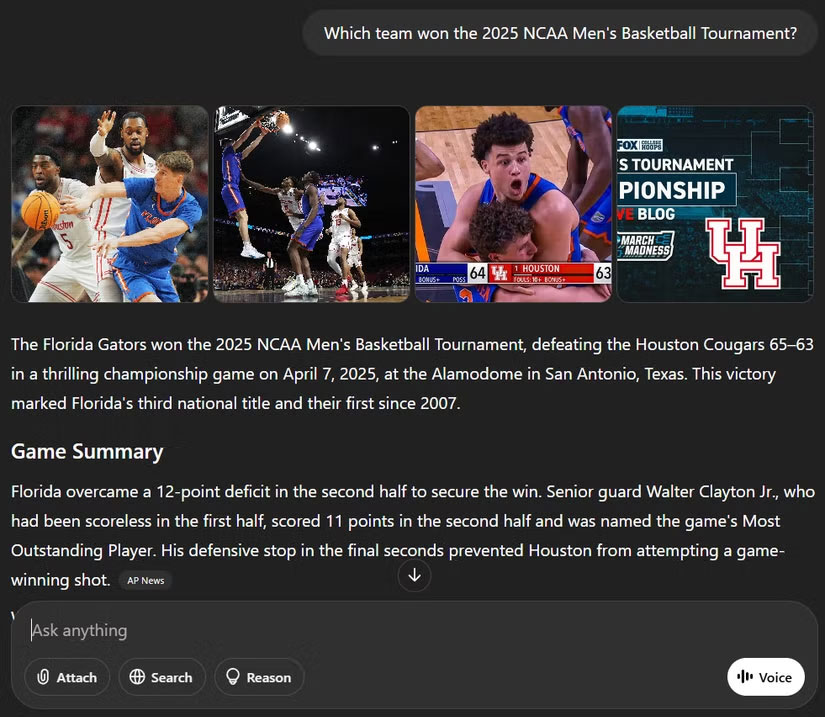
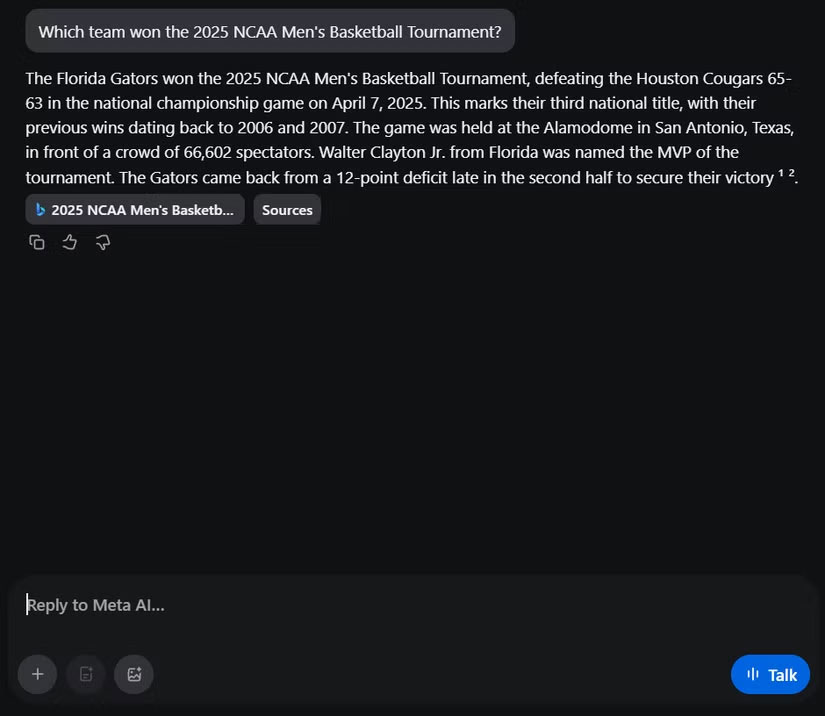
This focus on efficiency is a welcome change from other AI models that tend to over-explain. It's perfect if you just want the facts and don't need a lecture.
Impressive speed and responsiveness
Meta AI shines in terms of speed. Compared to other models, it feels exceptionally responsive. Tasks complete almost instantly and its responses are quick enough to keep your momentum going. It provides a smooth experience, allowing you to focus on your goals instead of waiting for the system to catch up.
Its architecture plays a big role here. Built on Meta's powerful infrastructure, it uses edge computing to minimize latency so that even complex tasks, like creating 3D videos from images, are completed quickly. Meta's Llama AI updates and upgrades have improved its processing speed, making it even more responsive for tasks like creating 3D videos.
These quick responses come at a minimal cost to accuracy, maintaining a high standard of accuracy that makes it reliable for simple questions. In everyday use, this responsiveness is a huge advantage. It makes a noticeable difference when much of your work depends on getting accurate answers quickly.
Conversational tone that doesn't feel overdone
Meta AI strikes a great balance between comfort and professionalism. It's approachable without feeling too familiar or robotic. Conversations feel natural, without the awkwardness of a humorous tone or overly polite tone.
Note : The following images compare Grok (left) and Meta AI (right).
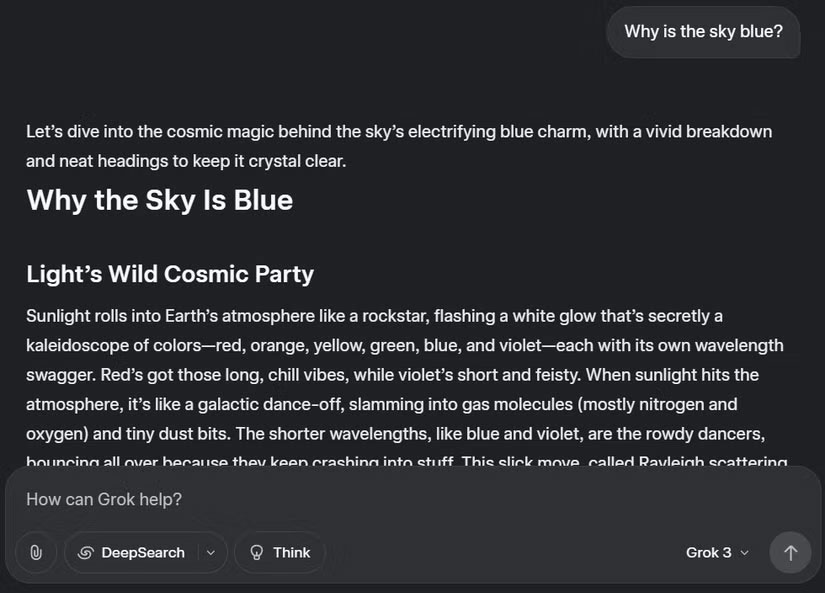

From light-hearted conversation to more practical requests, Meta AI is engaging without overdoing things, which is a great commonality compared to some AI models that tend to lean too heavily towards forced humor or overly politeness.
Meta AI app is extremely easy to use
Meta AI's standalone app is a big step forward for Meta AI, offering a clean, fast, and user-friendly experience. Unlike browser-based tools, it combines everything—chat, image creation, voice input, and even 3D video creation—into one responsive, intuitive space.
The app's sleek, minimalist design prioritizes ease of use without sacrificing functionality. Voice input is fully integrated and incredibly accurate, using advanced speech recognition to understand natural language and carry on conversations naturally. Talking is as fluid as typing, making interactions seamless and intuitive.
Even if you're not tied to Facebook or Instagram , the app can still function as a standalone. For those who are, it adds an extra layer of personalization by syncing across Meta's platforms. With easy-to-access tools, fast performance, and a layout that encourages deeper use, the standalone Meta AI app is one of the strongest parts of the overall experience.
Incredible image customization capabilities
Meta AI's image customization features are truly impressive. While many AI tools can generate images from text, Meta goes one step further, giving you control over specific aspects of style, color, lighting, and texture. This level of customization ensures you get an image that matches your vision, not just a generic interpretation of your prompt.

Similar to what you see in other leading AI platforms, Meta AI allows users to upload their own images and edit them using prompts. Meta AI can transform your original image based on instructions if you want to change the background, adjust the style, or add new elements. It opens up creative possibilities beyond just creating text to images, giving you more control and flexibility.
Note : The following side-by-side images compare the original image (left) with the edited result from Meta AI (right).


Turn photos into stunning 3D videos
One of the coolest features of Meta AI is its ability to turn images into short 4-second 3D MP4 videos. Instead of just being still images, these videos have motion and depth, providing a fresh way to interact with images. This is a unique feature that brings creativity that you won't find in many other AI tools.
With just a few clicks, you can create artistic and vibrant visual content. They are especially useful for creatives who want to create eye-catching social media posts, animated presentations, or marketing content that stands out in a crowded feed.
What's more, Meta AI lets you upload your own photos and bring them to life with animations. You can apply motion effects to add depth and realism, all guided by a simple prompt. This makes it easy to turn ordinary photos into animations, perfect for storytelling, branding, or adding a personal, creative touch to your images.
6 Areas Where Meta AI Falls Short
Despite its impressive capabilities, Meta AI still suffers from some major drawbacks, including limited technical reasoning and inconsistent memory. Meta's focus on platforms and some technical limitations prevent it from becoming a truly popular assistant.
Too focused on Meta's ecosystem
Meta AI's integration with Facebook, Instagram, and WhatsApp is a big plus for some, but it can be limiting if you're not deeply invested in Meta's platforms. For those active on Instagram, for example, Meta AI's personalized Instagram recommendations make the platform more enjoyable by connecting you to relevant content and communities.
If you don't actively use those services, however, it can feel more like a Meta-branded assistant than a fully independent tool. Many of its features are designed to bring you back into Meta's ecosystem, whether it's recommending Facebook posts or boosting Instagram Stories. As a result, Meta AI feels more like an extension of the company's engagement strategy than a full-fledged assistant.
Wrestling with technical reasoning
Meta AI excels at general knowledge and casual conversation, but it falls short when it comes to solving complex problems or explaining technical topics. If you encounter a difficult math problem or need a detailed scientific explanation, Meta AI doesn't have the depth or reasoning skills of models like GPT-4o or Claude.
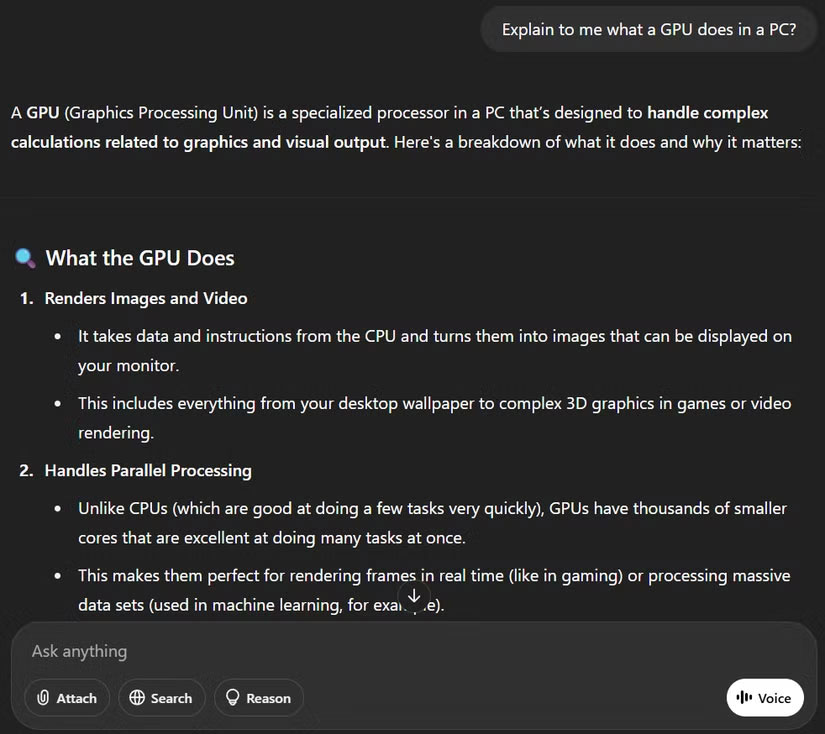
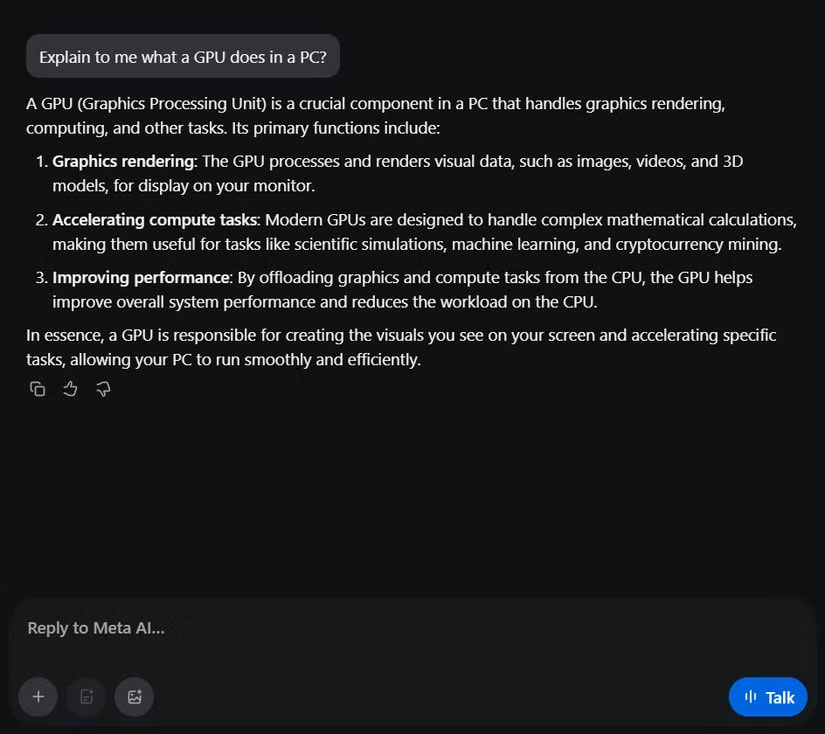
It's great for quick summaries, general knowledge, or casual conversation, but it falls short when it comes to detailed analysis or structured problem solving. This can be a major drawback for people who want to use AI for more technical or intellectual tasks.
Long-term memory is inconsistent.
Meta AI has a frustratingly inconsistent long-term memory, meaning it often fails to retain context from conversation to conversation. This can make tasks that require continuity, like ongoing collaborative projects or research, feel disjointed. Every time you start a new conversation, you're essentially starting from scratch.
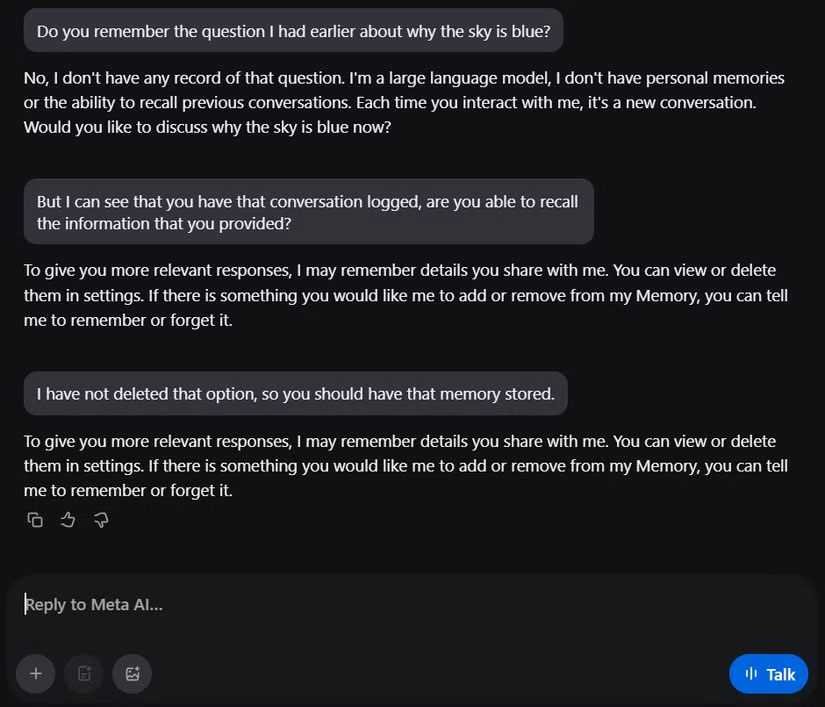
It also struggles with multi-part queries in a single conversation. Say you're planning a trip using Meta AI to help you. It will likely forget your budget or destination preferences at some point mid-conversation, forcing it to constantly backtrack.
This lack of memory makes the experience less personalized, especially when compared to other systems that do a better job of keeping track of past interactions.
No option for customizable AI characters
Another downside is the lack of customizable AI characters. While other assistants let you tweak their personalities or adjust how they respond to your requests, Meta AI remains fairly static.
Note : The following side-by-side images compare the main Grok screen (left) with the main Meta AI screen (right).
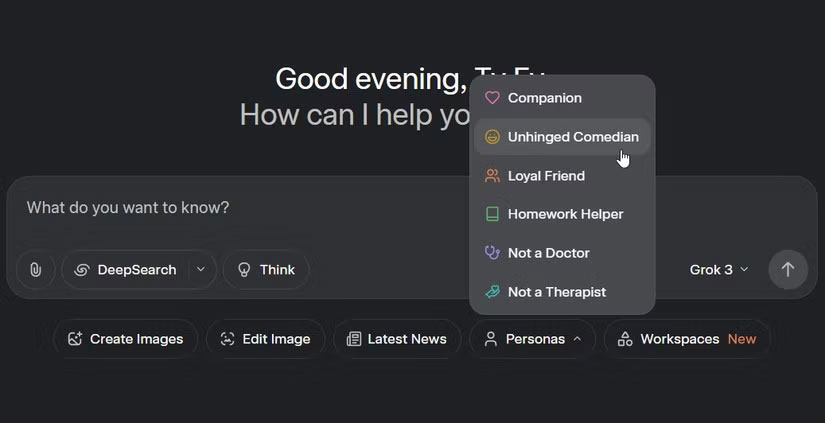
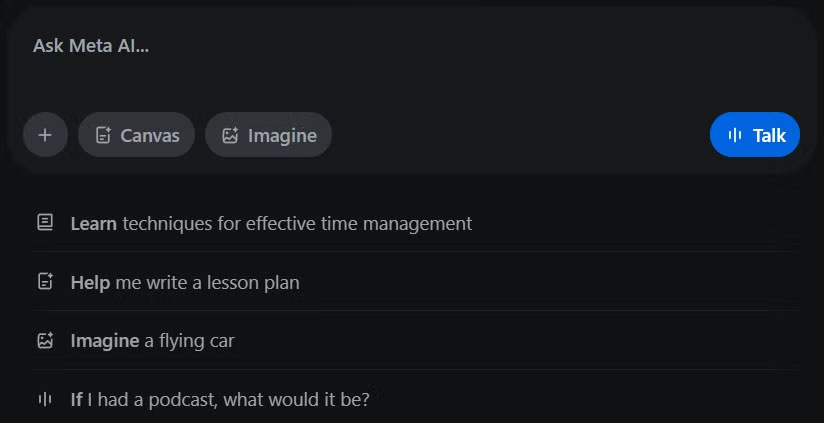
It feels like a missed opportunity, especially since you can intuitively assign specific personality traits to ChatGPT and other LLMs. If you prefer a more personalized AI experience, Meta AI doesn't deliver.
'No self-censorship' is mostly a marketing ploy
Meta AI's marketing often emphasizes its "no self-censorship" policy, suggesting it's willing to delve into difficult or controversial topics. In reality, however, it still has some safeguards in place to prevent it from engaging in sensitive topics altogether.
They may be more open than some models, but they still avoid certain topics, redirect conversations, and are cautious around things like political extremism or misinformation. Despite their promise, they don't quite push the boundaries as much as expected.
The boundaries are subtle but firm. Ask about a divisive lawsuit, and they'll summarize the court filings without touching on the ethical debate. Mention a conspiracy theory, and they'll shoot it down with multiple disclaimers. This is in contrast to LLMs like Grok, which lean toward unfiltered views. Meta AI's middle ground feels safe yet tame, at odds with their bold brand.
Creating images that still lack authenticity
While Meta AI's image generation features are fun and customizable, they fall short of realism. The images it generates often lack the sharpness and precision of newer models like GPT-4o or Aurora. The images can feel like a step back in time to 2024-style AI image generation: OK, but not quite the level of realism or detail we expect from AI today.


Images often look a bit stylized or 'fake' compared to what other tools can produce. Upon close inspection, you'll see flaws like blurry edges on small objects, textures that often look too smooth or plasticky, and hands that rarely produce accurate images.
This is fine for creative projects, but if you want something more realistic or true to a specific concept, you may feel unsatisfied.
Meta AI offers many benefits, especially in terms of image customization and quick, concise responses. But it still has some flaws, such as inconsistent memory and limited technical reasoning capabilities. These limitations have led many to reject Meta AI altogether, preferring other AI tools that are more flexible and private.
For those who use Meta's platform, it offers a lot of value with its speed and innovative features, but it's not yet the all-in-one assistant that many expect. It's an exciting start, and with further development, Meta AI could soon become a stronger competitor to other leading AI assistants.
You should read it
- ★ How to turn off Meta AI on Facebook, Instagram
- ★ Meta's new Horizon OS will lead to more VR headsets in the future
- ★ 5 Reasons Why Users Don't Use WhatsApp's Meta AI Button, Despite Its Usefulness
- ★ Meta launched Llama 3, claiming to be the best AI platform currently available
- ★ How to use Meta AI chatbot on Messenger